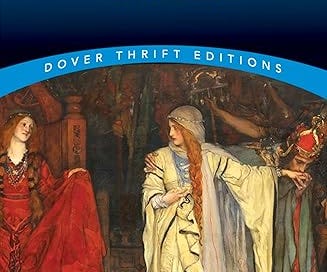If you are looking for the beginning of the study for Shakespeare’s “King Lear” then you can go HERE for a brief introduction. At the bottom of the introduction you will find the links to each section of the study guide as it becomes available. If you would like to see the growing list of book studies available for free on this site you can go HERE. Enjoy!
Virtues/Vices/Great Ideas: (Find them in the Text)
Loyalty, Appearance vs. Reality, Temperance, Malediction
Grammar Questions: (The Information of the Text)
What did King Lear do which upset his daughter, Goneril?
What did Goneril tell her steward, Oswald, that her servants should start doing (or not doing) concerning her father?
What plan did Kent adopt in order to get back into the presence of King Lear?
What did Kent do which confirmed his place alongside King Lear once again?
Lear asked the Fool (jester) “Dost thou call me fool, boy?” How did the Fool answer?
What three things did the Fool say might get him whipped?
What did Goneril claim that Lear’s men were doing?
What did Goneril tell Lear he should be since he is “old and reverend?”
What did Goneril say she intended to take from her father?
What did Lear ask for in his prayer to “nature” concerning his daughter, Goneril?
What warning did Albany give to his wife, Goneril?
By the end of this reading, what have both Goneril and Lear sent people to do?
Logic Questions: (Interpreting, Comparing/Contrasting, Reasoning)
Goneril said, “Old fools are babes again.” How does her treatment of her father, King Lear, continue a theme already seen in the previous lesson’s reading?
What should we infer about Kent’s character from the fact that he is trying so hard to stay near to King Lear?
Why did Lear strike Oswald?
What did the Fool mean when he told Kent “if thou follow him, thou must needs wear my coxcomb?”
The Fool recited a speech starting with the words “Have more than thou showest…” What was the point he was making in this little speech?
What did the Fool mean when he said, “lords and great men…and ladies too, they will not let me have all the fool to myself?”
Why did the Fool call King Lear a “shealed peascod?” What did he mean by that?
Compare Lear’s prayer against his daughter with Edmund’s opening lines in Act I, Scene II. What do you notice? What, if anything, ought we to make of this connection?
Lear said to Goneril, “Thou shalt find that I’ll resume the shape which thou dost think I have cast off for ever.” What did he mean by that?
Consider the various places “eyes” are mentioned in this current reading. Why do you think Shakespeare might be emphasizing the power of the eyes in this current reading?
Throughout this reading the Fool speaks some harsh words to King Lear, not least of which is the line, “Thou shouldst not have been old till thou hadst been wise.” Why might King Lear permit the Fool to speak so freely to him when he doesn’t seem to put up with disrespect from anyone else?
Evaluate the various speeches and statements made by the Fool to King Lear in this reading. What do you notice about the words of the “Fool” so far in this story?
Rhetoric Questions: (The Analysis of Ideas in the Text)
Consider the theme in this story of the elderly growing more childlike and children becoming more like parents to their own parents. What is the responsibility of children to their parents as the latter reaches old age? How ought children to work with their parents in situations when they begin to lose some of their physical and mental powers? What are some relational dangers and difficulties that might arise between parents and children from such a situation? What might be some guiding principles for thinking through how to handle this well?
The Fool is allowed to speak openly to King Lear (though he does so with good humor). How important is it to have people in our lives who are willing and able to tell us the truth even when we don’t like what they are saying? What might we say about our relationships (familial, friends, significant others) if we don’t allow them, or are uncomfortable with them, speaking freely to us? How do we cultivate honesty and forthrightness in our relationships without constantly hurting each other’s feelings unnecessarily?
Theological Analysis: (Sola Scriptura)
Read 1 Corinthians 1:18-31. How might we relate this passage to our current reading?
Read Mark 7:1-13. Connect this passage of Scripture to our current reading.



